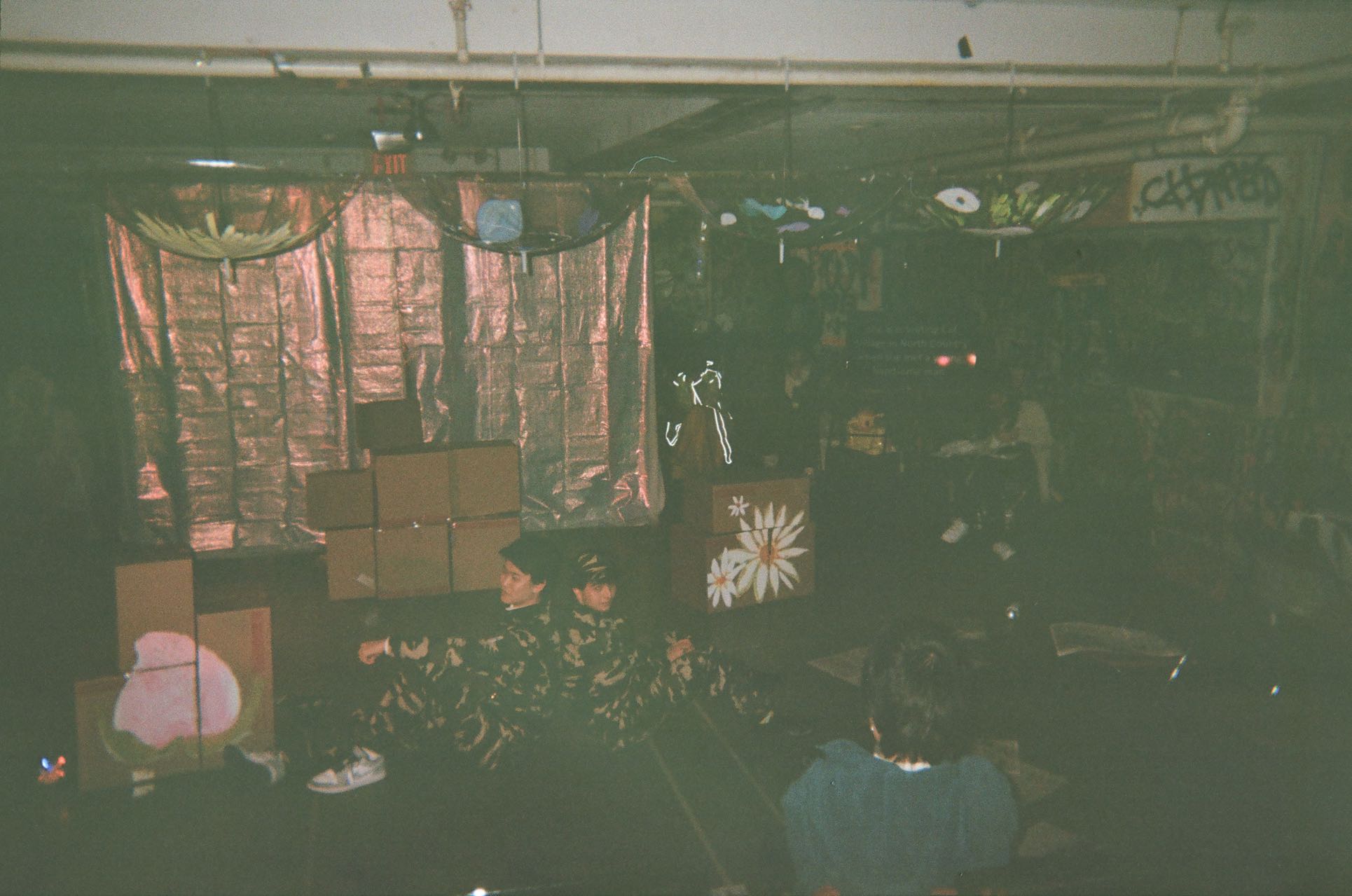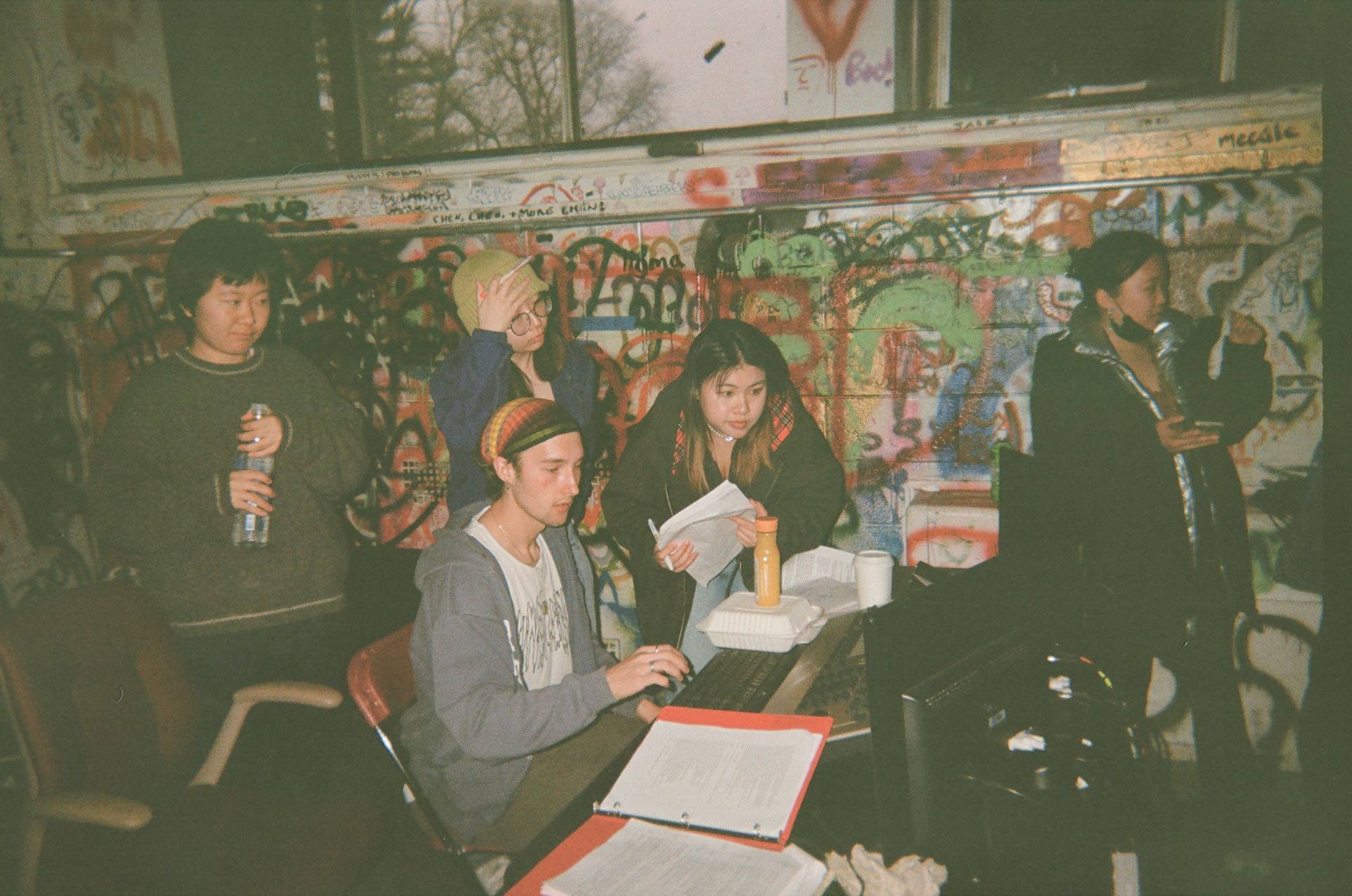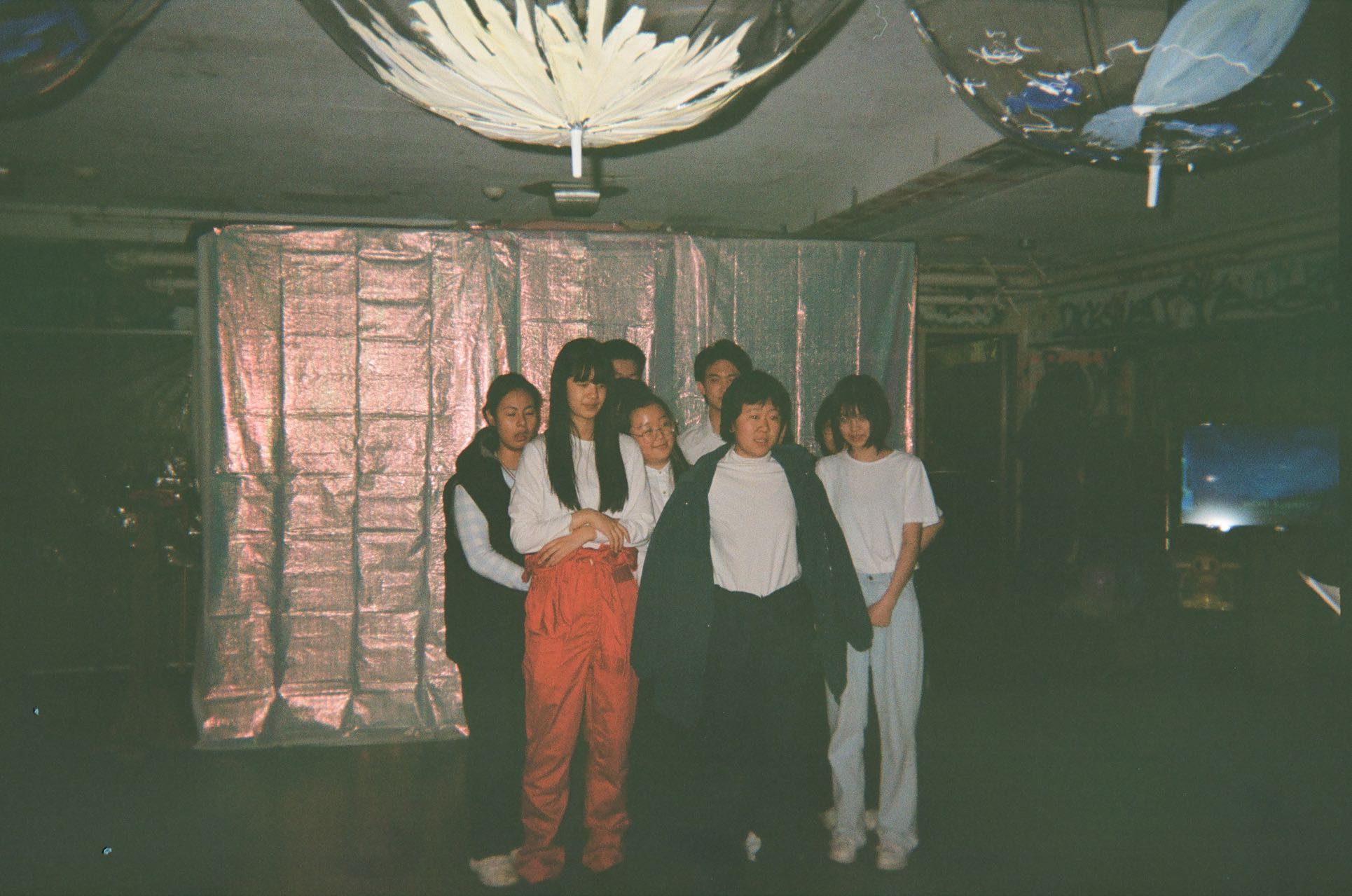A FABLE FOR NOW
Directed by Shuowen (Echo) Shen 申烁雯 & Chenchen (Scarlett) Long 龙晨晨
CAST
Xingyan Guo 郭星言…………………………………..…SomebodyHongyuan Yang 杨弘远………………..……………..Polar
Tina Han 韩天……………………………………………..Duck/Infant
Liang Liang 梁清玉…………………………..……………Panda/Infant
Evelyn Zhou 周妍成………..……..Immortal/Girlfriend/Nurse B
Wanhe Lin 林莞和…………………………..Woman/Mother/Infant
Spencer Jiang 姜政仲…………………………………A/Daddy/InfantIsaac
Platt Zolov 普左杰……………….……….B/Boyfriend/Infant
Margery Fang 方明霏………………..…Chicken/Daughter/Infant
Shuang He 何爽………………………………………Emcee/Nurse A
CREW
Yolanda Shi 石鹂阳 & Cas Kauffman…….Stage Managers
Shaoxuan Tian 田韶轩……………………………….……Dramaturg
Charlotte George……………………...Production Manager
Quincy Segal…………..….Assistant Production Manager
Simon Whitus………………………………Lighting Designer
Avivi Li 李汶楠……………………………………..……Sound Designer
Sonia Guan 关典………………………………….Costume Designer
Owen Wiley…………………………………………Set Designer
Liang Liang 梁清玉 & Rosie Li 李若谷……….Prop Designers
Hao Fu 傅好………………………………………Supertitle Operator
Jalen Richardson………………………… Fight Choreographer
Sophia Flynn…………………….…………Technical Support
Subtitle Designers
Hao Fu 傅好 & Zirui Zhang 张紫瑞 & Spencer Jiang 姜政仲
Special Thanks to…
Professor Jeremy Tiang, Professor Kaite Pearl, CEAS Department,‘92 AVMs, Jason Tey, Tracy Wu,
Joe Fonseca, Sophia Flynn,Harry Yu, Vicky Gong, Bold Boldbayar, Rose Cook, Yanyu Lin, Zhao Yifei
︎ The Original Script (Traslated by Jeremy Tiang)
︎ Review from The Wesleyan Argus
Content Warning: The following theater production contains the use of sexual language, mentioning of sexual abuse, abortion, violence, and discussion of transphobia. When dealing with these sensitive contents, our creative team is making every effort to handle them carefully. Instead of turning away from existing problems and actions that cause extreme harm, we believe that theater can act as a mediator that has the potential to facilitate effective discourse on these topics while also providing a certain level of distance. We aim to reflect on the current reality and advocate for change. Additionally, this production includes scenes of warfare and gunshots. Viewer discretion is advised. We encourage all audience members to take care of themselves and seek support if needed. If you require assistance, please speak to a member of the crew.
Content Warning: The following theater production contains the use of sexual language, mentioning of sexual abuse, abortion, violence, and discussion of transphobia. When dealing with these sensitive contents, our creative team is making every effort to handle them carefully. Instead of turning away from existing problems and actions that cause extreme harm, we believe that theater can act as a mediator that has the potential to facilitate effective discourse on these topics while also providing a certain level of distance. We aim to reflect on the current reality and advocate for change. Additionally, this production includes scenes of warfare and gunshots. Viewer discretion is advised. We encourage all audience members to take care of themselves and seek support if needed. If you require assistance, please speak to a member of the crew.
劇本是在2013年末寫成的,那時的台灣正在吵著多元成家的議題,兩韓好像又為了飛彈試飛的問題爭論國族意識或民族情感,食安問題從離很遠的中國紙包子、假雞蛋,飄洋過海到台灣的食用油全面淪陷,「全球暖化嚴重!北極熊瘦骨如柴」讓我看了覺得身為人類很抱歉,全球勞工移動且流動,「鬼島塊陶」哀號遍野,22k方案廢止,但台灣年輕人還是在領22k,台灣有港口的城市都在搶黃色小鴨,圓仔出生才幾個月,動物園跟港口都大排長龍互相爭萌……這些事情在台灣演出時還不算遠,但到了2020的現在(尤其在經過一場人類浩劫後),想起來都覺得好遠好遠。
遠到這些拉里拉雜的新聞事件,到現在都不比活著。(當然如果要論現今的狀態,那又會是另起一本劇本的話題了,還是先回來回來)這堆新聞砸得我頭眼昏花(加上要交畢業劇本的死線在臨),但又不想專門為單一議題寫獨立的劇本。當時想做的是將這些亂噴亂吐的新聞作瞬間切面,原本還擔心會不會太瑣碎,但正好讀到 Caryl Churchill 的 “A Mouthful of Birds”,眼睛一亮就是這個!
斷面切片完全不是問題!或許看起來是乘載很多議題的嚴肅劇本,但我通常覺得
能讓人感到荒謬荒謬好笑好笑就夠了,或許笑著笑著就哭了呢。
—— 魏于嘉 (2020)
The play was written at the end of 2013. That year, I felt overwhelmed by the ongoing debates and social movements happening in Taiwan: same-sex marriage, LGBT rights, food safety, low salaries, etc. On top of that, politics and consumer culture were intertwined with people’s daily life. While North and South Korea were competing to test missiles and polar bears were starving to death due to global warming, Florentijn Hofman’s Rubber Duck artwork and the first local-born panda at Taipei Zoo seemed to capture most of the Taiwanese media’s attention. These issues were still relevant by the time the show debuted, but for us in 2020, especially after the disastrous covid outbreak, they almost seemed like something so distanced that are no longer affecting our lives.
As I was approaching the deadline for my thesis, I felt overwhelmed by the sheer volume of news coming in. Rather than writing separate plays for each issue, I decided to capture the chaotic nature of the news by creating a collage of momentary snapshots. At first, I was worried that the play might be too fragmented, but when I came across Caryl Churchill’s “A Mouthful of Birds,” I knew this was it. The structure wouldn’t be a problem at all! Although the play may seem like a serious drama that tackles many social issues, I personally believe that making people feel absurd and laughable is more than enough: maybe they’ll end up crying while laughing.
—— Wei Yu-chia (2020)
*Translated by Hongyuan Yang 杨弘远
Director’s Note
Welcome to the first Mandarin production at Wesleyan. We’re thrilled to invite youto a story that was told in its very own language. A Fable For Now 现世寓言, originally written by 魏于嘉 Wei Yu-chia (2013), won the Taiwanese Literature Award for playwriting in 2014. We proudly present its US premiere here at Wesleyan! This production could never happen without the generous support of individuals.
Many thanks go to Professor Jeremy Tiang, who led us to this wonderful play and also connected us with the original playwright 魏于嘉 Wei Yu-chia. Thank you to 魏于嘉 Wei Yu-chia, who consents to us to recreate her work— all she asked from us is to have fun. Thank you, Charlotte George and the whole Spike Tape crew; without them, we would not have been able to make the show. Our production team is full of first-timers, including actors making their debut, first-time stage managers, light designers, and more. However, their level of work far exceeds their titles, and we are consistently impressed by the high quality they bring to each project. This show is dark but funny. It is full of laughter and tears. We want to put forth the question: How can we coax meaning and happiness out of our brief time on this dying planet? We invite you to find out the answers with us.
—— Chenchen (Scarlett) Long & Shuowen (Echo) Shen 龙晨晨 & 申烁雯
How about we make a Mandarin play on this campus? Not some diasporic tragedies. Not some Asian exotic tales under the white gaze. But a Mandarin play. A story that is told in Mandarin. How about we turn the table this time and claim our space, telling a story in our nativetongue. Is that possible? Can we create space for Mandarin play to exist here? It’s quite a gamble. And we are all in.
—— Chenchen (Scarlett) Long 龙晨晨
This play was me attempting to answer, yet ending up raising even more questions. Tracing back to the impulse that droves me to initiate this production, I can not help but think back to the restless nights spent anxiously scrolling through an endless stream of information on my phone half a year ago, gradually losing touch with my native tongue and with myself, becoming a stranger to my own body and mind. To be the other, getting used to being the other.
Before studying theater at Wesleyan, most of my theater education took place at the BlackBox Theater in my high school. Student floods into the space, squeezing in like sardines, so close that it is difficult to take anything out of their pocket. There were times when students sat directly on the stage because the seating tickets were all out. Back then, I often brought pen and paper into the theater and wrote Crooked Chinese characters in the darkness for theater reviews.
After experiencing enough amount of proscenium stage—grand, imposing, glowing halls supported by towering Romanesque columns - I realized there is no longer a place likethe black box theater. Every seat comes with a specific price, with an additional $50 for the four seats to the right. Beneath the glossy veneer of modernity, humans are frequently plagued by this binary and gridded society. That’s when I started to understand that questioning itself is yet hard enough—influencing some is influencing many. What are those tall Romanesque columns supporting, after all? It was not until one of the rehearsals we had earlier. As the lights dim, the feeling of that BlackBox Theater finally returns to me. My heart starts beating hard again.
—— Shuowen (Echo) Shen 申烁雯
Dramaturg’s Note
As someone who has never got her hands on theatre stuff, I saw myself more as in conversation with multiple voices than a “dramaturge” in the revising process. I am curious about what Wei Yu-Chia felt and thought, her hopes and despairs, from beneath each and every metaphor and example she crafted across lines. I wondered: what social issues of her time was she trying to respond with this “fable for now?” I ask myself: situated across from the ocean in 2023—ten years after she completed the original script, how can my political contexts echo the inquires of her time? How might I, holding dear and near her sensitivity and sharpness as a re-writer, pass on the courage for reflections she has imbued the audience with?
I also imagined how the characters in the play—alongside the real-life social groups they might resonate with—chat with each other out loud. I imagined myselftalking to actors, directors, various people at Wesleyan, and the confusions of ourtime unspeakable yet acutely felt by all of us. Words empower my body and soothmy heart. At the same time, they endow me with more responsibilities—abouthow to be gentle towards each voice and about how to contain their weighted reality.I hope you can find some consoling as we vibe with each others’ confusions. Ifyou find the content disturbing, I hope this stage can provide somewhat space forthat and I wish that you never give up thinking.
—— Shaoxuan Tian 田韶轩
About The Rubber Duck
The Rubber Duck is a massive inflatable sculpture created by the Dutch artist Florentijn Hofman. This artwork is an enlarged version of a classic rubber duck toy, standing over 26 meters tall and weighing over 600 kg. It has become a popular attraction, drawing large crowds wherever it goes. Since its debut in 2007, Hofman’s Rubber Duck has been installed in various cities worldwide, including Beijing, Hong Kong, Sydney, Sao Paulo, and Los Angeles, among others. The Rubber Duck has become a global symbol of happiness, and Hofman has stated that he hopes his artwork will inspire people to let go of their worries and enjoy the moment. The Rubber Duck represents Hofman’s belief in the importance of playfulness and whimsy in our daily lives. It symbolizes the simple pleasures of childhood and serves as a reminder to reconnect with our inner child. The artwork has been interpreted as a commentary on various social and political issues, such as the importance of community and global cooperation. However, at its core, the Rubber Duck is a joyful, lighthearted, and playful artwork that brings smiles to people’s faces wherever it goes.









